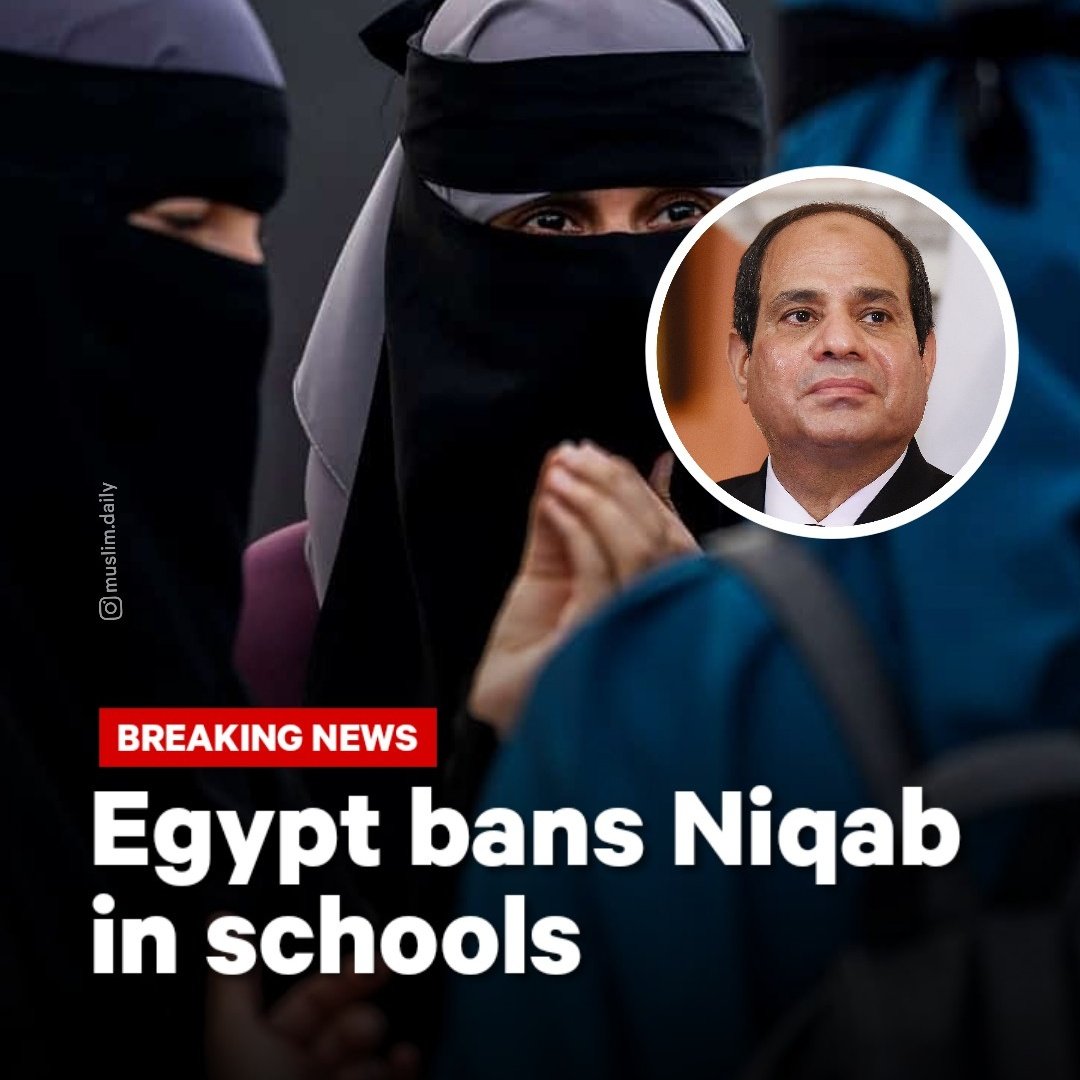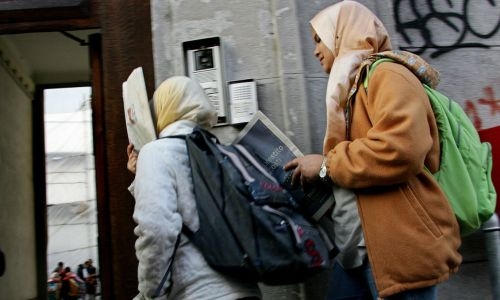S
Shruti Dasgupta
Guest
Recently, Egypt has made a significant decision to restrict the wearing of the niqab by girls in schools. The full-face veil will not be part of the girls’ uniform from the new academic year. This decision was announced by Reda Hegazy, the Minister of Education, bringing the hijab debate back into the spotlight. The international news is peppered with contrasting and conflicting views and debates on religious attire, education, and government regulations. Therefore, this issues may have broader implications in the context of global restrictions on religious clothing.

PC X @muslimdaily
Minister Hegazy’s announcement outlines the new guidelines regarding religious attire in schools. According to these guidelines, hair covers are permitted but they must not obscure the student’s face. Moreover, only the Directorate of Education-approved models or illustrations promoting hair cover are allowed. Minister Hegazy has re-emphasized the importance of the guardian’s role in a student’s decision to wear a hair cover. He stressed that this choice should be entirely voluntary, free from any external pressure or coercion.
Additionally, the ministry has adopted a coordinated strategy for school uniforms. The school board will collaborate with trustees, parents, and teachers to determine the appropriate uniform color for both male and female students. This decision aims to ensure a unified and coordinated appearance for all students.
Modifications to school uniforms will be considered at the start of each educational stage, with a minimum of three years between alterations.

PC News of Bahrain
While Egypt’s decision is significant for its population, the new policy will have an impact on the global communities. Egypt’s new policy will place the government regulation on religious attire in educational institutes in the center stage of a debate. Several countries, including Austria, Bosnia and Herzegovina, Canada, France, Kazakhstan, Kosovo, Kyrgyzstan, Russia, and Uzbekistan, have already imposed bans on the wearing of headscarves and other religious coverings in schools and colleges.
India is also struggling with its hijab controversy. The debate in India arose in 2022 when Muslim girls were denied entry to classes for wearing hijabs in Karnataka. The Karnataka High Court upheld the ban, stating that wearing a hijab is not an essential religious practice of the Islamic faith. However, the Congress-led Karnataka government has lifted this ban. Their policy of minority appeasement has allowed extremists to flout court orders and encourage or force Muslim women to wear hijabs.
Thus, the new policy by Egypt shall lead its people to differentiate religious practices from education and progress. The policy shall also cast shade and shame at the Congress-led Karnataka government for their regressive attitude towards women in hijab at learning institutes.
Policies and decisions on religious dress codes spark debates on religious freedom. The issues highlights individual rights and the role of the state in regulating personal choices. While most of Egypt is celebrating this policy, some extremists are against such guidelines set by the government. The uniformity and secularism in educational institutions are usually viewed by religious zealots and fanatics as an infringement upon religious liberties.
Thus, striking a balance between preserving religious diversity and ensuring that schools focus on learning and education is a tightrope walk for all nations. These issues have an extra spark when they involve the Islamic community. The young religion and its Stringent views on women and liberty make news across the globe daily. Therefore, Egypt’s recent move is directly contrary to Iran’s policies and is in consonance with the trends across the globe related to religious attire and education. It remains to be seen if the policy can demonstrate to fanatics how Muslims can walk the path of progress.
The post Egypt’s Niqab Ban: Is it a Catalyst for Global Change? appeared first on The Jaipur Dialogues.
Continue reading...
Egypt’s New Guidelines

PC X @muslimdaily
Minister Hegazy’s announcement outlines the new guidelines regarding religious attire in schools. According to these guidelines, hair covers are permitted but they must not obscure the student’s face. Moreover, only the Directorate of Education-approved models or illustrations promoting hair cover are allowed. Minister Hegazy has re-emphasized the importance of the guardian’s role in a student’s decision to wear a hair cover. He stressed that this choice should be entirely voluntary, free from any external pressure or coercion.
Additionally, the ministry has adopted a coordinated strategy for school uniforms. The school board will collaborate with trustees, parents, and teachers to determine the appropriate uniform color for both male and female students. This decision aims to ensure a unified and coordinated appearance for all students.
Modifications to school uniforms will be considered at the start of each educational stage, with a minimum of three years between alterations.
Guardians will have the freedom to choose where to purchase uniforms. All students must adhere to the uniform regulations. Any violator will face exclusion from the school.
The Global Debate and Perspective

PC News of Bahrain
While Egypt’s decision is significant for its population, the new policy will have an impact on the global communities. Egypt’s new policy will place the government regulation on religious attire in educational institutes in the center stage of a debate. Several countries, including Austria, Bosnia and Herzegovina, Canada, France, Kazakhstan, Kosovo, Kyrgyzstan, Russia, and Uzbekistan, have already imposed bans on the wearing of headscarves and other religious coverings in schools and colleges.
India is also struggling with its hijab controversy. The debate in India arose in 2022 when Muslim girls were denied entry to classes for wearing hijabs in Karnataka. The Karnataka High Court upheld the ban, stating that wearing a hijab is not an essential religious practice of the Islamic faith. However, the Congress-led Karnataka government has lifted this ban. Their policy of minority appeasement has allowed extremists to flout court orders and encourage or force Muslim women to wear hijabs.
Thus, the new policy by Egypt shall lead its people to differentiate religious practices from education and progress. The policy shall also cast shade and shame at the Congress-led Karnataka government for their regressive attitude towards women in hijab at learning institutes.
A Road Riddled with Challenges and Controversies
Policies and decisions on religious dress codes spark debates on religious freedom. The issues highlights individual rights and the role of the state in regulating personal choices. While most of Egypt is celebrating this policy, some extremists are against such guidelines set by the government. The uniformity and secularism in educational institutions are usually viewed by religious zealots and fanatics as an infringement upon religious liberties.
Thus, striking a balance between preserving religious diversity and ensuring that schools focus on learning and education is a tightrope walk for all nations. These issues have an extra spark when they involve the Islamic community. The young religion and its Stringent views on women and liberty make news across the globe daily. Therefore, Egypt’s recent move is directly contrary to Iran’s policies and is in consonance with the trends across the globe related to religious attire and education. It remains to be seen if the policy can demonstrate to fanatics how Muslims can walk the path of progress.
The post Egypt’s Niqab Ban: Is it a Catalyst for Global Change? appeared first on The Jaipur Dialogues.
Continue reading...
